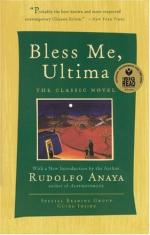|
This section contains 5,601 words (approx. 19 pages at 300 words per page) |

|
SOURCE: Kanoza, Theresa M. “The Golden Carp and Moby Dick: Rudolfo Anaya's Multi-Culturalism.” MELUS 24, no. 2 (summer 1999): 159-71.
In the following essay, Kanoza identifies parallels between Rudolfo Anaya's Bless Me, Ultima and Herman Melville's Moby-Dick, arguing that Anaya's multicultural style embraces Indian myth, biblical references, and echoes from the traditional literary canon.
In Bless Me, Ultima, Rudolfo Anaya presents a world of opposites in the New Mexican village of Guadalupe. The parents of the young protagonist Antonio have strikingly different temperaments, as dissimilar to each other as the backgrounds from which they hail. Maria Luna Marez, the pious daughter of Catholic farmers from the fertile El Puerto valley, steers her son toward the priesthood and a ministry in an agrarian settlement. Gabriel Marez, Antonio's adventurous father, is descended from a long line of nomadic horsemen; he expects his son to share his wanderlust, and he hopes that as compadres...
|
This section contains 5,601 words (approx. 19 pages at 300 words per page) |

|


